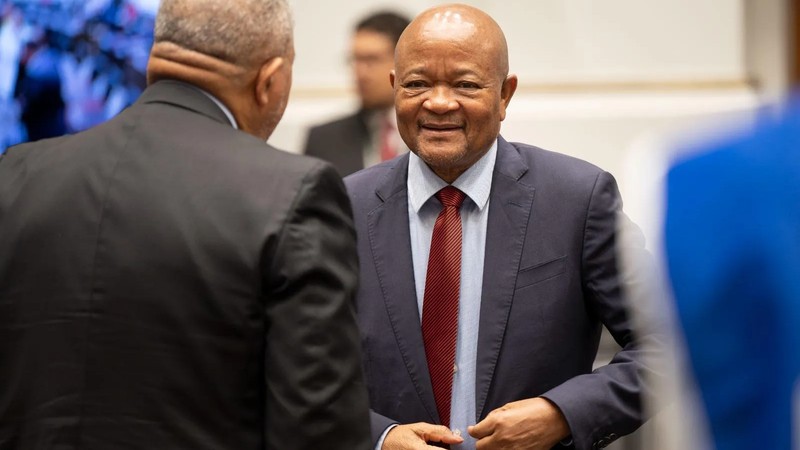Suspended Police Minister Senzo Mchunu on Thursday for the first time responded to the allegations of corruption leveled against him by KwaZulu-Natal police commissioner Nhlanhla Mkhwanazi.
Testifying at the parliamentary inquiry probing Mkhwanazi’s allegations of corruption in the criminal justice, Mchunu defended his decision to issue the controversial to disband the Political Killings Task team (PKTT) in December 2024, amid claims that he did not consult the top brass of the police.
“From 6 July I am wearing General Mkhwanazi. From 6 July I am smelling General Mkhwanazi and this is the first opportunity to explain myself and I am going to do justice to that,” Mchunu said in response to a slew of explosive allegations made by Mkhwanazi in the wake of his July 6 press conference.
“I am pleading with you to give me the opportunity to do that, considering as well that he has gone to the Commissions for quiet a long time piling accusations on me… so I am responding,” said Mchunu.
The Parliamentary inquiry was established to probe the unlawful dissolution of the PKTT, the freezing of filling vacancies within Crime Intelligence, alleged corruption by senior leaders in SAPS, and public and political interference in the work of the police.
Mchunu said said he wrote the directive to disband the PKTT after he had looked at its performance, which did not meet his standards-a claim that was contradicted by Mkhwanazi and Masemola when they gave testimony.
“I thought we would have done more on all the difficulties we were coming across to make SAPS work better.”
Mchunu insisted that he wrote the directive to disband the PKTT in response to Mkhwanazi’s claim that the document had been authored by someone else.
“The truth is that I sat down in that room alone and wrote what ended up being a directive,” he said adding that he had shared the letter with ministerial advisor Advocate Vusi Pikoli and chief of staff Cedrick Nkabinde.
“I take personal responsibility for that letter and stand by it,” said Mchunu, adding that his devices can be searched to establish the origin of the document.
“I will hand it over. You will never find it having originated anywhere and I was sitting alone. When I wrote it, was written by me.”
Mchunu insisted that he did not exceed his powers, and neither did he flout the Constitution or the Police Act.
In an apparent response to Mkhwanazi’s testimony that Mchunu was the subject of an investigation, Mchunu said he knew he was being probed by the police.
“I have nothing to do with criminal syndicates.”
Mkhwanazi had accused Mchunu of having ties to controversial businessman Vusimuzi ‘Cat’ Matlala and claimed he was “financially supporting” Mchunu’s political career.
Matlala had a lucrative contract with the police before it was abruptly cancelled when he was arrested for attempted murder in May.
Earlier, Mchunu said the PKTT was never part of the police organogram and that it enjoyed the status of a task team established for a particular purpose.
“There has always been a clear distinction between a task team and a unit. Units become part of an organogram,” he said, adding that the task team was meant to be evaluated frequently and was not envisaged to exist for a long term.
Mchunu said the PKTT was disbanded based on work study undertaken and signed in 2019 by National Commissioner Fannie Masemola’s predecessor General Khehla Sitole, who recommended the resuscitation of specialised units, including the murder and robbery unit.
He said he had made policy statements at meetings with senior police management in December where he had raised concerns about the PKTT, including a meeting to discuss the SAPS organisational structure, when he the made policy statement together with Masemola.
“I made remarks and further indicated there must reconsideration and review of certain capacity such as PKKT about addressing serious crime,” he said, adding that SAPS should guard against creating structures that duplicated existing capabilities to deal with taxi killings and murders.
He also said the the PKTT was to be used across the country, instead of being confined to KwaZulu-Natal.
Mchunu said that he had acted against the task team because of confidential information received from KwaZulu-Natal violence monitor Professor Mary de Haas and former policewoman Patricia Mashale, among others.
“These (are the things) that made me feel if these matters are not attended to expeditiously, they have the potential of damaging the reputation of SAPS and defeating the ends of justice.”
Mchunu told the inquiry that he had wanted to optimise the budget of the SAPS as the senior management had complained about budget cuts and lacking resources while the PKTT was well resourced.
Its officers received better accommodation and made larger expense claims, Mchunu said.
